Canon EF 24-70mm f/2.8L USM
Canon EF 24-70mm f/2.8L USM: Performance
Wide open at 24mm, sharpness in the centre is already very good and improves steadily as the lens is stopped down as far as f/5.6 where its performance in the centre is outstanding. The quality towards the edges also improves as the lens stops down, reaching good levels at f/4. Images taken at f/5.6 display the highest levels of sharpness across the frame for this focal length.Zooming the lens to 35mm results in the sharpness wide open dropping a little, but still remaining good in the centre. Quality towards the edges of the frame is fair, but this improves dramatically as the lens is stopped down. Peak quality across the frame is achieved at f/8, where the sharpness in the centre is outstanding, and very good towards the edge of the frame.
Centre sharpness at 70mm and f/2.8 is very good and the quality towards the edges is improved over 35mm also. Peak quality across the frame is achieved between f/5.6 and f/8, where sharpness in the centre is excellent and the resolution towards the edges is very good.
| Resolution at 24mm | Resolution at 35mm |
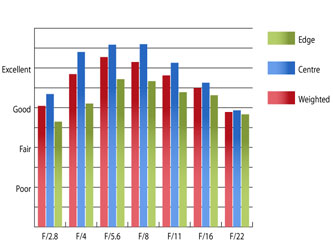 | 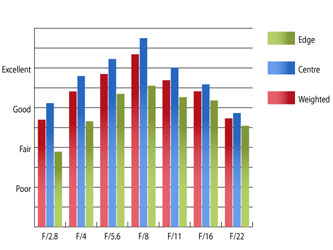 |
| Resolution at 70mm | How to read our graphsThe blue column represents readings from the centre of the picture frame at the various apertures and the green is from the edges. Averaging them out gives the red weighted column.The scale on the left side is an indication of actual image resolution. The taller the column, the better the lens performance. Simple. For this review, the lens was tested on an Canon EOS 5D MkII using Imatest. |
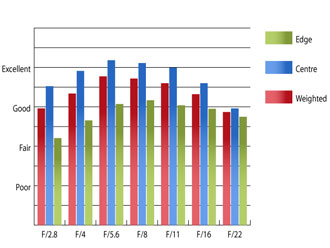 |
Chromatic aberrations are quite well controlled, with Imatest detecting fringing covering 1.3 pixel widths at 70mm and f/8 near the edge of the frame. This amount of fringing shouldn't pose too many issues, only becoming visible in very large prints, or harsh crops taken from near the edge of the frame.
| Chromatic Aberrations at 24mm | Chromatic Aberrations at 35mm |
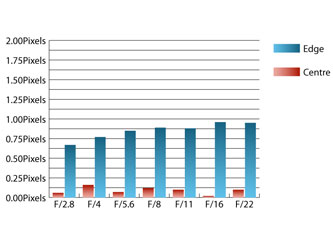 | 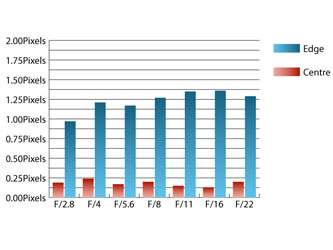 |
| Chromatic Aberrations at 70mm | How to read our chartsChromatic aberration is the lens' inability to focus on the sensor or film all colours of visible light at the same point. Severe chromatic aberration gives a noticeable fringing or a halo effect around sharp edges within the picture. It can be cured in software.Apochromatic lenses have special lens elements (aspheric, extra-low dispersion etc) to minimize the problem, hence they usually cost more. For this review, the lens was tested on an Canon EOS 5D MkII using Imatest. |
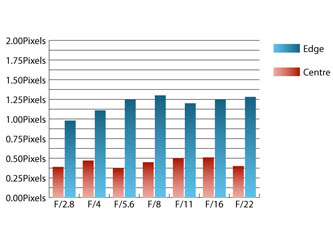 |
Barrel distortion at 24mm will be noticeable, but Imatest detecting 3.44% barrelling, which isn't too high a level. At 70mm the barrelling found at 24mm is replaced with 1.37% pincushion distortion, which may be quite noticeable under certain circumstances. Luckily the distortion pattern at each end of the zoom is uniform across the frame, so should be quite easy to correct in image editing software afterwards.
Strong light sources just outside the frame can cause flare on occasion, especially when shooting at the wide end of the zoom range. The supplied hood does a decent job of shielding the front element at longer focal lengths. Shooting into the light generally causes a noticeable loss of contrast, especially at bright apertures.
 |  | |
| Maximum magnification – ISO200, 1/125, f/11, 70mm | Shooting into the sun – ISO100, 1/250, f/8, 24mm | |
 |  | |
| Wide-angle – ISO100, 1/100, f/16, 24mm | Telephoto – ISO100, 1/80, f/16, 70mm |
 | DxOMark provides objective, independent, RAW-based image quality performance data for lenses and digital cameras to help you select the best equipment to meet your photographic needs. Visit the DxOMark website for tests performed on the Canon EF 24-70mm f/2.8L USM. |
Add your message
Login required
Please login here or if you've not registered, you can register here. Registering is safe, quick and free.
Please login here or if you've not registered, you can register here. Registering is safe, quick and free.
photodo Stats
1102 lenses
428 MTF tests
74 in-depth photodo reviews
100+ users join each day
Help the lens community by reviewing or rating a lens today via our lens search
428 MTF tests
74 in-depth photodo reviews
100+ users join each day
Help the lens community by reviewing or rating a lens today via our lens search
Latest Lens Reviews
- Chinon 28mm f/2.8 Vintage Lens Review
- Canon EF 70-200mm f/4L IS II USM Lens Review
- Samyang AF 85mm f/1.4 EF Review
- Sigma 70mm f/2.8 DG Macro Art Review
- Samyang AF 24mm f/2.8 FE Review
- Meike 50mm f/1.7 Review
- Tamron 70-210mm f/4 Di VC USD Review
- Lensbaby Burnside 35mm f/2.8 Review
- Asahi Super Takumar 50mm f/1.4 Review
- Asahi Super-Multi-Coated Takumar 135mm f/3.5 Review
